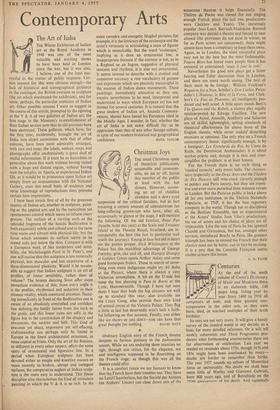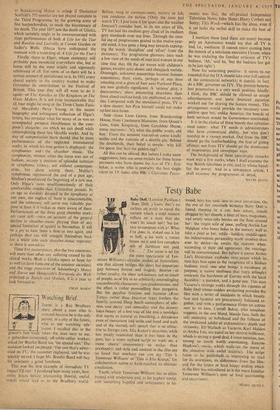Centuries
AT the end of the ninth voluine of Grove's Dictionary of Music and Musicians there is an elaborate table, 140 pages long, listing year by year from .1400 to 1954 all note, and their greatest con-
composers of temporaries in the other arts, as they were born, died, or reached multiples of their tenth birthday.
Its uses are not very many. It will give a handy survey of the, musical world in any decade, as a basis for more detailed reference. Or it will tell weekly columnists and Third Programme pro- ducers what forthcoming anniversaries there are for observation or celebration. Last year we needed no reminder about 1756, though 1656 and 1856 might have been overlooked by many— deaths are harder to remember than births. The year 1957 sounds no echoes of Mozartian force or universality. No doubt we shall hear some little of Morley and Giovanni Gabrieli, born 400 years ago, and of Buxtehude on the 250th anniverqiry of his death. And somebody at Broadcasting House is asleep if Domenico Searlatti's 555 sonatas are not played complete in the Third Programme, by the growing army of fine harpsichordists, to mark the bicentenary of his death. The year 1857 saw the death of Glinka, ' which certainly ought to he commemorated with stage performances of both A Life for the Tsar and Russian and l,nrhnil1a at Covent Garden or Sadler's Wells. (Decca have anticipated the moment with a recording of A- Life for the Tsar.) Finally there is Elgar; whose centenary will probably pass unnoticed everywhere else, but at -home will be the most widely and vigorously celebrated of all. For some of us there will be a certain amount of punishment in it. In 1951 every choral society in the country wanted to make Gerontius its contribution to the Festival of Britain. This year they will all want to do it again----or The Apostles, or The Kingdom, or The Music Makers. it is not even inconceivable that all four might be sung at the Three Choirs Festi- val. Mercifully Percy Young, in his recent biography and subsequent collection, of Elgar's letters, has revealed what for many of us was an unsuspected personal likeableness in the corn— poser's character. on which we can dwell while contemplating these less likeable works. And by way of compensatiOn there should also be more performances of the neglected instrumental works, in which his true genius is displayed: the symphonies and % the chamber music. The symphonies, written when the form was out of fashion, occupy a position of splendid isolation in symphonic history, not without contempor- aries, but alone - among them. Mahler's symphonies represented the end of a past age, Sibelius's proclaimed the beginning of a new one. Only Elgar's were unselfconsciously of their comfortable middle-class Edwardian present. In an age so slavishly devoted to the symphony as our own, the neglect of theM is unaccountable, and the centenary will serve one valuable pur- pose 'at least iE.it makes US more aware of them.. Performances of the three great chamber works are -rarer still --more on account of the general decline in chamber-music playing than of any special limitation of appeal in th&nselves. It will be a joy to hear them a time or two again, and perhaps they too will smuggle themselves back for a while into such chamber-music repertory a there is nowadays.
These five ,atasterpieces, plus the two concertos, will more than offset any suffering caused by the choral works. With a Glinka opera to hope for as well (at least from one'of the amateur societies), and the stage premi&es of Schoenberg's Moses and Aariiif and tlindemitles Harmonic der Welt promised at Zarich and Munich, it is a year to look forward to.
coraN MASON















































 Previous page
Previous page